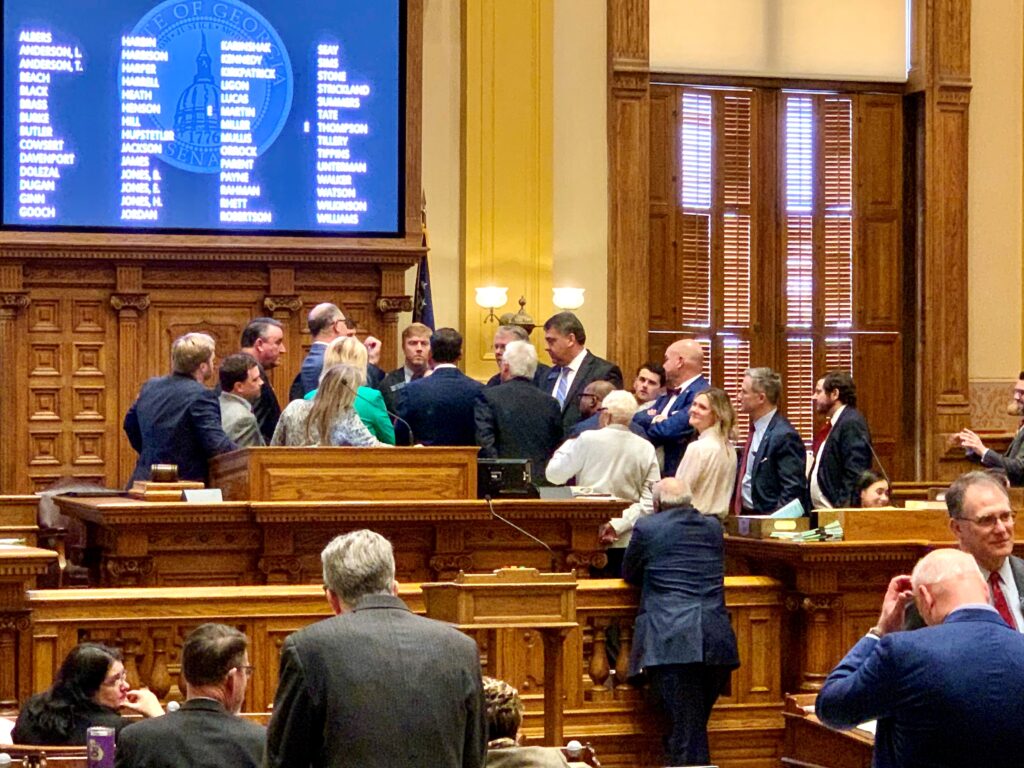
Crunch time has come for state agencies in Georgia wondering how much money they will have in the bank come July 1, as lawmakers return Monday for a reboot of the 2020 legislative session in Atlanta.
Hundreds of millions of dollars are at stake for agencies in charge of statewide public health programs, mental health and addiction treatment, child welfare services, the courts system, public schools, and more.
To float the budget cuts, thousands of state employees are facing furloughs and the continued prospect of working remotely to save office costs. Layoffs lie in wait for some. Others, like Georgia Supreme Court justices, have said they might work for free a few days out of the year.
“We’re facing some real challenges,” said Sen. Ellis Black, R-Valdosta. “We’ve got to put together a budget and it’s going to involve some cuts that’s gonna hurt.”
The 2020 legislative session resumes on Monday, June 15, after being suspended in mid-March as concerns mounted over the spread of coronavirus. Lawmakers are legally required to pass a 2021 fiscal year budget and send it to Gov. Brian Kemp for signing before July 1.
Georgia’s finances look to be a few billion dollars in the hole after months of social distancing and business closures compelled by coronavirus, the global pandemic that had infected at least 55,000 people and killed more than 2,400 in Georgia by Friday afternoon.
To meet a 14% budget trimming target, state agencies have offered up about $3.5 billion in spending cuts across a broad range of government-funded services, including furloughs for preschool teachers, the closure of a state prison in South Georgia and less money for local health departments.
Recently, Kemp signaled agencies may not need to cut quite so much as state tax revenues have declined less steeply than at first projected. More likely, agencies will have to reckon with 11% cuts to their budgets, saving hundreds of millions of dollars that would otherwise be nixed.
That would help officials overseeing critical programs for mentally and physically disabled persons and the state’s fight against coronavirus to soften the blow to employees, allowing for fewer or no furlough days instead of weeks without pay.
But 11% cuts are still steep. Mental health and addiction services would have to be sliced by around $135 million, forcing the state Department of Behavioral Health and Developmental Disabilities to withhold millions of dollars from outpatient and residential programs aimed at staving off crises that can lead to hospital stays for mentally ill persons.
County health boards, which receive grant funding from the state Department of Public Health, would hold onto roughly $3.8 million with 11% cuts as opposed to 14%. But that would still leave county health officials out almost $14 million total, leaving local virus-fighting staff with less means to continue the pandemic fight.
“We were already working with a frayed safety net,” said Alex Camardelle, a senior policy analyst with the Georgia Budget and Policy Institute. “Now that we’ve hit the pandemic, income insecurity and economic insecurity have exploded.”
Key to the upcoming budget negotiations will be how much appetite lawmakers have for raising new revenues or yanking lucrative tax breaks from companies. In particular, some lawmakers are eying a potential increase in the state’s tobacco sales tax, a move many nonprofit and think-tank groups have pushed in recent weeks.
“I hope maybe we can find with looking at tax credits that may not be so beneficial, to find ways to bring some revenue back in, as well as perhaps an increase in the cigarette tax,” said Sen. John Albers, R-Roswell.
Already, several budget-writing lawmakers have differed on how to approach implementing the spending cuts. Some, for instance, have floated the idea of imposing salary cuts instead of furloughs for key positions like judges and preschool teachers.
But that idea has drawn opposition from some top lawmakers like Senate President Pro Tempore Butch Miller, who objected to salary slicing after it was raised at a hearing late last month.
“Asking them to work the same hours for less pay, as some have suggested, is unacceptable,” said Miller, R-Gainesville. “While furlough days are not ideal, we certainly will not be asking state employees to work without adequate compensation.”
Meanwhile, much of the belt-tightening depends on moving targets, such as whether the federal government follows through on COVID-19 relief funds and how people react to fewer restrictions on businesses and health-care providers in the coming months.
For example, the state Department of Community Health’s proposed spending cuts totaling $413 million would be largely offset by a recent boost in matching federal funds for Medicaid costs and by fewer healthy people making trips to the doctor amid the coronavirus scare.
But those figures could change if the federal government claws back certain special benefits put in place during the pandemic or if people flock to doctor’s offices in the coming months, according to state health officials.
It’s for that reason many state lawmakers are looking to draft the budget in pencil strokes rather than ballpoint ink, with expectations high that drastic mid-year budget adjustments may need to be made in early 2021 to cover unpredictable spending gaps.
“I think this year, more than any other year at least since I’ve been here, the amended budget process is going to be super important because there are so many unknowns,” said Sen. Dean Burke, R-Bainbridge, who chairs the Senate Appropriations Community Health Subcommittee.
“I know I’m going to be disappointed that I can’t do more,” he added. “But know that what we are able to adjust will come from the combined wisdom of everyone here.”